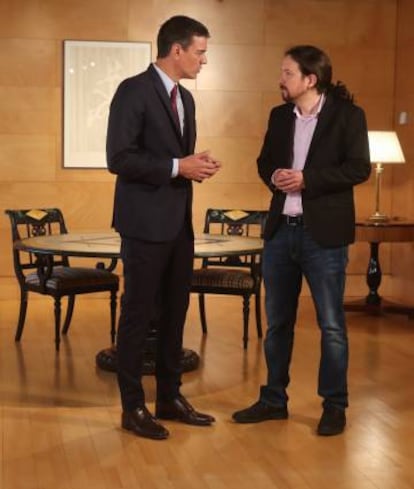Acting Spanish PM Pedro Sánchez says deal with Podemos is dead in water
Speaking on Monday morning on the Cadena SER radio network, the Socialist politician said that the left-wing party refused an offer of places in the Cabinet

With a week to go before Spain’s acting prime minister submits to a congressional vote to confirm his reappointment, the bid looks increasingly doomed to fail.
Pedro Sánchez of the Socialist Party (PSOE) has announced that his talks with the leftist Unidas Podemos are over, dimming his chances of securing the necessary majority of votes in Congress on July 22 and 23.
While the PSOE won the April 28 election with 123 seats, this is shy of an overall majority. Unidas Podemos came in fourth with 42 lawmakers, behind the Popular Party (66) and Ciudadanos (57). But the latter two groups have refused to back Sánchez’s bid, leaving the anti-austerity group and a collection of smaller regional parties to negotiate with.
Cabinet clash
Sánchez and Unidas Podemos leader Pablo Iglesias have been clashing over the makeup of the future government, which Iglesias says should be a coalition with Cabinet members from both political groups.
But Sánchez’s best offer is to accept a few Podemos members with a lower public profile to hold some ministerial positions. The acting PM says that deep differences between both parties over certain key issues would make a joint government of party leaders effectively impossible.
On Monday, Sánchez told the Cadena SER radio network that bilateral talks are over after he learned of the content of a internal consultation that Iglesias is about to hold, asking grassroots members what Podemos’ position should be at the investiture vote next week.
This is the first time in 40 years that the candidate to form a government makes a proposal of this type, and is met with the reply that it’s a stupid proposal
Acting PM Pedro Sánchez
Sánchez has described this Podemos consultation as “a masquerade,” whose only purpose is to justify Iglesias’s refusal to back Sánchez. He added that at their meeting last week, Iglesias rejected an offer “to bring qualified people from Unidas Podemos into the Cabinet.”
“This is the first time in 40 years that the candidate to form a government makes a proposal of this type, and is met with the reply that it’s a stupid proposal,” said Sánchez.
The acting PM said that Iglesias plans “to vote no, along with Vox,” citing a far-right party that has made significant gains at recent elections across Spain.
“Last Friday they called a consultation that does not reflect our latest proposal from Thursday,” said a visibly annoyed Sánchez. “I think I’ve been quite flexible and reasonable in my proposal. I need a government that is not paralyzed by internal contradictions. They may propose names, but they can’t impose them.”
Unidas Podemos’ reply
In response, Alberto Garzón, leader of the United Left group that is part of Unidas Podemos, said on Twitter that Sánchez seeks “unconditional support” from other parties.

“He has begun a media campaign to blame other parties for the deadlock. He’s been at it for three months, going around in circles to see whether a majority emerges through magic or blackmail,” said Garzón.
“The week of blackmail has begun,” added Juan Carlos Monedero, a founding member of Podemos who is no longer part of the leadership but continues to play an influential role. Monedero asked Sánchez to “respect the nearly four million voters” who support Unidas Podemos.
If Sánchez is unsuccessful, the country could be facing a fresh general election in the fall, which would be the fourth in under four years. This week, the acting PM will ask the PP, Ciudadanos and Unidas Podemos to at least abstain at next week’s vote so that he can officially form a government and take Spain out of a protracted deadlock.
English version by Susana Urra.
Tu suscripción se está usando en otro dispositivo
¿Quieres añadir otro usuario a tu suscripción?
Si continúas leyendo en este dispositivo, no se podrá leer en el otro.
FlechaTu suscripción se está usando en otro dispositivo y solo puedes acceder a EL PAÍS desde un dispositivo a la vez.
Si quieres compartir tu cuenta, cambia tu suscripción a la modalidad Premium, así podrás añadir otro usuario. Cada uno accederá con su propia cuenta de email, lo que os permitirá personalizar vuestra experiencia en EL PAÍS.
¿Tienes una suscripción de empresa? Accede aquí para contratar más cuentas.
En el caso de no saber quién está usando tu cuenta, te recomendamos cambiar tu contraseña aquí.
Si decides continuar compartiendo tu cuenta, este mensaje se mostrará en tu dispositivo y en el de la otra persona que está usando tu cuenta de forma indefinida, afectando a tu experiencia de lectura. Puedes consultar aquí los términos y condiciones de la suscripción digital.








































